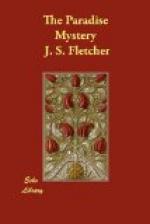“You did see him that morning?” asked Mary.
“I saw him, of course, unexpectedly,” answered Ransford. “I had been across the Close—I came back through the south aisle of the Cathedral. Just before I left the west porch I saw Brake going up the stairs to the galleries. I knew him at once. He did not see me, and I hurried home much upset. Unfortunately, I think, Bryce came in upon me in that state of agitation. I have reason to believe that he began to suspect and to plot from that moment. And immediately on hearing of Brake’s death, and its circumstances, I was placed in a terrible dilemma. For I had made up my mind never to tell you two of your father’s history until I had been able to trace these two men and wring out of them a confession which would have cleared him of all but the technical commission of the crime of which he was convicted. Now I had not the least idea that the two men were close at hand, nor that they had had any hand in his death, and so I kept silence, and let him be buried under the name he had taken—John Braden.”
Ransford paused and looked at his two listeners as if inviting question or comment. But neither spoke, and he went on.
“You know what happened after that,” he continued. “It soon became evident to me that sinister and secret things were going on. There was the death of the labourer—Collishaw. There were other matters. But even then I had no suspicion of the real truth—the fact is, I began to have some strange suspicions about Bryce and that old man Harker—based upon certain evidence which I got by chance. But, all this time, I had never ceased my investigations about Wraye and Flood, and when the bank-manager on whom Brake had called in London was here at the inquest, I privately told him the whole story and invited his co-operation in a certain line which I was then following. That line suddenly ran up against the man Flood —otherwise Fladgate. It was not until this very week, however, that my agents definitely discovered Fladgate to be




